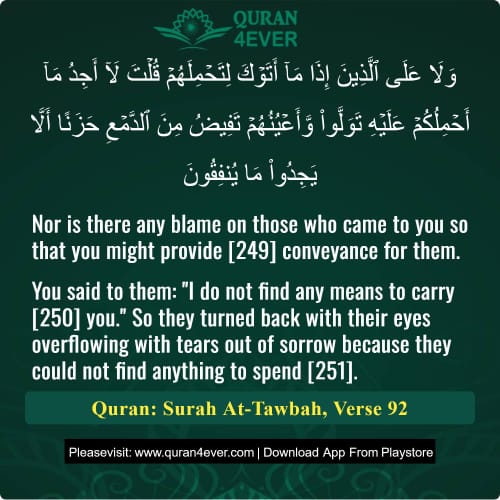
Transliteration:( Wa laa 'alal lazeena izaa maaa atawka litahmilahum qulta laaa ajidu maaa ahmilukum 'alaihi tawallaw wa a'yunuhum tafeedu minaddam'i hazanan allaa yajidoo maa yunfiqoon (End Juz 10) )
“Nor is there any blame on those who came to you so that you might provide [249] conveyance for them. You said to them: 'I do not find any means to carry [250] you.' So they turned back with their eyes overflowing with tears out of sorrow because they could not find anything to spend [251].”
From this verse, two important issues emerge:
To beg from the Holy Prophet ﷺ is a real honor for the believer.
Seeking help from the Prophet ﷺ is not an act of shame, but rather a privilege. The companions who requested conveyance were honored in their act of seeking assistance from the Prophet ﷺ, knowing that he would help them if he could.
To express regret for not doing good deeds is an act of worship.
The companions felt deep sorrow for not being able to participate in the battle. This regret and tears are viewed as acts of worship, demonstrating sincerity and a desire to engage in good deeds, which is highly valued in Islam.
This verse was revealed when some companions came to the Holy Prophet ﷺ with the intention of participating in the battle, asking for riding animals. The Prophet ﷺ, not having any available animals, told them, "I do not find any means to carry you." Hearing this, the companions returned with their eyes filled with tears due to their inability to participate.
The verse makes it clear that their non-participation in the battle would not be censured. The use of the phrase "I have nothing" was not a refusal, but an excuse. The Prophet ﷺ, despite being the Master of all Divine treasures, used this phrase because there was no immediate practical solution available. Allah Almighty’s message was that He and His Messenger would make them rich with blessings (S9:V73). This teaches that the Prophet ﷺ was granted mastery over all Divine bounties, and any apparent limitations were for the sake of giving excuses to the believers.
From this, we learn that expressing sorrow, shedding tears, and regretting not doing good deeds are all acts of worship. Similarly, regret and crying after sinning are also considered acts of worship. These emotional responses show a deep connection with the will of Allah and a sincere desire to align with His path.
The tafsir of Surah Taubah verse 92 by Ibn Kathir is unavailable here.
Please refer to Surah Taubah ayat 91 which provides the complete commentary from verse 91 through 93.
(9:92) Nor can there be any cause for reproach against those who, when they came to you asking for mounts to go to the battlefront, and when you said that you had no mounts for them, they went back, their eyes overflowing with tears, grieving that they had no resources to enable them to take part in fighting.[93]
93. Such people as felt a strong urge for Jihad but could not join it because of some really genuine excuse, will be counted by Allah among those who actually took part in it, even though they could not join it in person and do anything practically for it. This is because they were sincerely grieved at their absence from Jihad for no fault of theirs, just as a man of the world would be grieved if he were deprived of some lucrative business or of some high profit. Allah considers such a one as on duty, because his heart was serving in the Way of Allah, though he had been deprived of active service on account of some genuine excuse. The Prophet (peace be upon him), while returning from Tabuk, stated the same thing like this: “There are some people at Al-Madinah (at this time) who have been traveling and marching all along with you through every valley. Naturally the companions to whom he was speaking were wonder struck at this. So they asked, “While staying at Al-Madinah?” He replied, “Yes, while staying at Al- Madinah! This is because they were compelled by the circumstances to stay behind at Al-Madinah: otherwise they would certainly have accompanied you.”
[497]- No mounts or even shoes were available.

For a faster and smoother experience,
install our mobile app now.
Related Ayat(Verses)/Topics